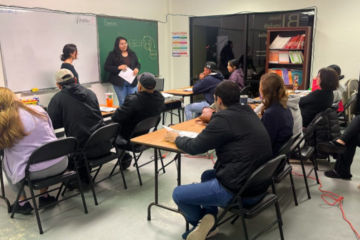Citizenship Classes Continue Strong


Some of the changes made to the civics test in 2020 were good, in the sense that they made for better worded questions or questions that helped students learn new things because they were more oriented towards U.S. history and government. But some of the new questions or answers were clearly more from a right-wing perspective — like the one about the 10th Amendment, because states’ rights is a right-wing cause. Or the question, ‘Who does a senator represent?’ The acceptable answer was changed from ‘all the people of the state’ to ‘the citizens of the state.’ Under Trump, there was a pretty deliberate attempt to suppress the number of people applying to become U.S. citizens, and I have no doubt that the motivation behind these changes [to the test] was to make it more difficult for applicants to become citizens.
However, given all that was (or was not) happening during the transition from the Trump to Biden administrations, it seemed unlikely that updated materials would be available through USCIS by the time that BIIN’s spring classes were slated to begin. Realizing this, citizenship program leaders and interns got to work in early January 2021, revising the PowerPoint presentations, student handbooks and other materials they use in class, to reflect the requirements of the new test.


Non-profits like BIIN often rely on curriculum guides and flash cards provided by USCIS to help applicants prepare for the civics test and other parts of the naturalization exam.
Regarding this policy change, Jeremy Brett observed, “I was surprised and relieved when the Biden administration changed the rules about the civics test. I had thought this would be far down on their list of priorities, but right off the bat, they changed it!” Despite the work that the interns had put into updating the program’s materials, Niki was inclined to look on the bright side: “I don’t believe that my work and efforts have gone to waste, because I learned so much about the naturalization process and things that applicants need to know.”
Given this change, what then would happen for students whose classes at BIIN were beginning in late February? A quick survey of registered participants was made, and while those who had submitted their applications to USCIS between December 1 and March 1 were offered the option of preparing for either test, the overwhelming majority chose to focus on the 2008 version. As Niki noted, “It’s completely understandable that they preferred the shorter test. I would have too!”

With this bit of drama (and the considerable effort it required to prepare new materials) behind them, BIIN’s citizenship team — long-time volunteer instructors, interns, and a crew of committed volunteers — launched spring classes on February 27. The ten-week sequence is offered both in English and in Spanish, and meets via Zoom for two hours on Saturday mornings or afternoons. So far, attendance and participation in both sections have been good. When asked what is important for BIIN’s supporters to know at this juncture, Jeremy Brett responded: “We want people to know that BIIN’s citizenship classes are still going on, despite the pandemic. Preparing for the naturalization exam is an important process. It’s one of the most significant things that students in the class will do. It can really change their lives in so many ways.”
Along with Jeremy, Niki, Geraldy, Spanish lead instructor Rich Woodward and so many others who have invested in BIIN’s citizenship program, we are heartened to see that neither the pandemic nor the shifts in federal directives regarding the civics test have put a damper on people’s desire to learn about this country’s history and government, and as members of local, state, national and international communities, to do their part to make democracy work.
If you too think this is valuable work, consider making a donation to support the citizenship program at BIIN, or signing up to volunteer to help during Saturday sessions via Zoom. We also invite you to watch for another installment in this series on BIIN’s support for prospective U.S. citizens, coming in April.


